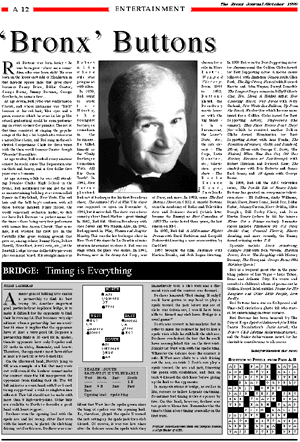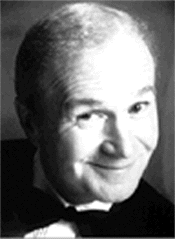 Red Buttons was born lucky - he was born poor - show me a comedian who was born rich? He was born on the lower east side of Manhattan in that miracle square mile that gave show business Fanny Brice, Eddie Cantor, George Burns, Jimmy Durante, George Gershwin, to name a
few... Red Buttons was born lucky - he was born poor - show me a comedian who was born rich? He was born on the lower east side of Manhattan in that miracle square mile that gave show business Fanny Brice, Eddie Cantor, George Burns, Jimmy Durante, George Gershwin, to name a
few...
At age seven, Red (who was really Aaron Chwatt, and whose nickname was "Irish" because of his red hair, blue eyes and a green sweater which he wore in his public school graduation) could be seen performing on street corners for pennies. The act at that time consisted of singing the popular songs of the day - his boyish alto voice was a natural for choirs, and Red sang in the celebrated Coopermans Choir for three years with the then world famous Cantor Joseph
"Yussele" Rosenblatt.
At age twelve, Red worked every amateur contest he could enter. The Depression was on thick and heavy, and a five dollar first prize was a
bonanza.
At age sixteen, while he was still attending Evander Childs High School in the Bronx, Red auditioned for and got the job as an entertaining bell hop at a tavern called Ryan's in City Island, New York. The red hair and the bell hop's uniform with all those buttons inspired Dinty Moore, the world renowned orchestra leader, to dub our hero Red Buttons - a perfect name for the times - there being very few performers with names like Aaron Chwatt. That summer, Red worked his first job in the Catskills (that great training ground that gave us, among others, Danny Kaye, Robert Merrill, Moss Hart, Jerry Lewis, etc.,) at the Beerkill Lodge for one dollar fifty per week plus room and board. His straight man was Robert Alda whose wife was pregnant with
Alan.
In 1939, Red went to work for Minsky, the youngest burlesque comedian in the business. He billed himself as the
"Only Burlesque Comedian With All His Own Teeth". In 1941, Jose Ferrer plucked Red out of burlesque for his first Broadway show, The Admiral Had A Wife. The show was supposed to open on December 8, 1941, but it never did. The show was a farce comedy about Pearl Harbor - great timing! Teeth". In 1941, Jose Ferrer plucked Red out of burlesque for his first Broadway show, The Admiral Had A Wife. The show was supposed to open on December 8, 1941, but it never did. The show was a farce comedy about Pearl Harbor - great timing!
In 1942, Red did Vicki on Broadway with Jose Ferrer and Uta Hagen. Also, in 1942, Red appeared in Wine, Woman and Song for Minsky. This was the last burlesque show in New York City since the La Guardia administration determined to close it. Red was on stage when the place was raided. In 1943, Buttons, now in the Army Air Corp., was chosen for a role in Moss Hart's, Winged Victory. From 1948 to 1952, Buttons played the Broadway movie houses with the big bands - the Paramount, the Loew's State, etc.; the cafe circuit - The Copa, Latin Quarter, etc.; television guest shots - The Berle Texaco Hour, Cavalcade of Stars, and more. In 1952, came The Red Buttons Show (on CBS). A smash! Buttons won the Academy of Radio and Television Arts and Sciences Award (which later became the Emmy) as Best Comedian of 1953. The series lasted three years, the last season on
NBC.
In 1956, Red did A Midsummer Night's Dream with Basil Rathbone and Leopold Stokowski directing a new score written by Carl
Orff.
1957 brought the film Sayonara with Marlon Brando, and Josh Logan directing.
In 1958 Red won the Best Supporting Actor for Sayonara and the Golden Globe Award for Best Supporting Actor. A movie career followed with Imitation General with Glen Ford; The Big Circus; Hatari! with Howard Hawks and John Wayne; Darryl Zanuck's The Longest Day; a cameo in Billy Wilder's One, Two, Three; A Ticklish Affair; Your Cheating Heart; Gay Puree with Judy Garland; Five Weeks In a Balloon; Up From the Beach; Harlow (for which he was nominated for a Golden Globe Award for Best Supporting Actor); Stagecoach (the remake); They Shoot Horses Don't They? (for which he received another Golden Globe Award Nomination for Best Supporting Actor) with Jane Fonda; The Poseidon Adventure; Gable and Lombard; Movie, Movie with George C. Scott; Viva Knievel; When Time Ran Out; Off Your Rocker; Reunion at Fairborough with Robert Mitchum and Deborah Kerr; The Ambulance with Eric Roberts and James Earl Jones; and 18 Again with George
Burns.
In 1966, Red did the ABC television series, The Double Life of Henry Phyfe. Buttons has guested on every major television show - Ed Sullivan, Andy Williams, Dinah Shore, Perry Como, Redd Fox, Eddie Fisher, Johnny Carson, Merv Griffin, Mike Douglas, Bill Cosby Show, and Dean Martin Roasts (where he did his famous Never Got a Dinner routine). Dramatic shows include Playhouse 90; U.S. Steel; Studio One; General Electric; Knotts Landing; and more recently, the Emmy Award winning series
E.R.
Specials include Louis Armstrong, Chicago Style with Ben Vereen; Telethon Power; Leave
'Em Laughing with Mickey Rooney; The Users; and George Burns 95th Birthday
Special.
Red is a frequent guest star in the gambling palaces of Las Vegas - Lake Tahoe, Reno and Atlantic City. He wrote and recorded a children's album of poems on the Golden Record label entitled Poems for My Daughter and Other Little People, Love
Daddy.
Red Buttons has a star on Hollywood and Vine - full circle for a ghetto kid who started by entertaining on street
corners.
Red Buttons has been honored by The City of Hope Spirit of Life Award; the Eddie Cantor Foundation's Suzie Award; the Friar's Club Lifetime Achievement Award; and the Junior Achievement Award for his charitable contributions to all causes.
Edited from the Internet and
other sources
BRIDGE:
Timing is Everything
Julian Laderman
A major goal of bidding is to enable a partnership to find its best trump fit. Another important goal, particularly at duplicate bridge, is to make it difficult for the opponents to find their best trump fit. This becomes very significant when a partnership has an excellent fit since it implies that the opponents have at least a very good fit. Suppose a partnership finds a 10 card fit in spades, then its opponents have only 3 spades and 23 cards in clubs, diamonds, and hearts. Therefore, the opponents must have either at least a 9 card fit or two 8 card
fits.
On the illustrated hand, North's jump to 4H is an example of a bid that may work out well even if the declarer cannot make the contract since the bid may prevent the opponents from finding their fit. The 4H bid indicates a weak hand with 5 or 6 card trump support and a void or singleton in a side suit. This bid should not be made with more than 9 high-card-points. Other bids are available to North to describe a good hand with heart
support.
|
NORTH
ª A
J 8
© Q
10 8 5 2
¨ 7
§ 7
5 4 2 |
|
|
WEST
ª
K Q 7
© 7
¨
A 10 4 3 2
§ 10 9 8 3 |
|
EAST
ª
10 9 6 4 2
© A
¨
J 9 8 6
§ K Q J |
|
SOUTH
ª
5 3
© K
J 9 6 4 3
¨ K
Q 5
§ A
6 |
|
|
|
|
DEALER
: South
EAST-WEST is VULNERABLE
WEST
NORTH EAST SOUTH
1 H
Pass
4 H
Pass
Pass
Pass
Opening Lead: spade king
|
|
Declarer won the opening lead with the spade ace and led trump. After East won with the heart ace, he played the club king driving out South's ace. Declarer was confident that West has the spade queen since the king of spades was the opening lead. He, therefore, played the spade 5 toward the jack setting up the spade jack for a club discard. Of course, it was too late since after the defense won the spade trick they immediately took a club trick and a diamond trick and the contract was
doomed.
Declarer lamented "Bad timing. If only I could have gotten to my hand to play a spade toward the jack before my ace of clubs was driven out, I would have been able to discard my club loser. Bridge is a cruel game."
South was correct in his analysis that in order to make the contract he had to lose a spade trick while he still held the club ace. Declarer overlooked the fact that he could have accomplished this on the first trick. Simply let West win with the spade king. Whatever the defense does the contract is safe. If West now shifts to a club driving out the ace, on trick 3 South can play a spade toward the ace and jack, finessing the queen with confidence, and then on trick 4 discard the club loser before giving up the lead to the
opponents.
In many situations at bridge, as well as in life, success or failure depends on timing. Sometimes bad timing is thrust upon us by fate. On this hand, however, declarer was too quick to blame fate. Remember that the time to think about timing is usually on the first trick.
Professor Julian Laderman (Math
and Computer Science)
is a Life Master of ACBL |
